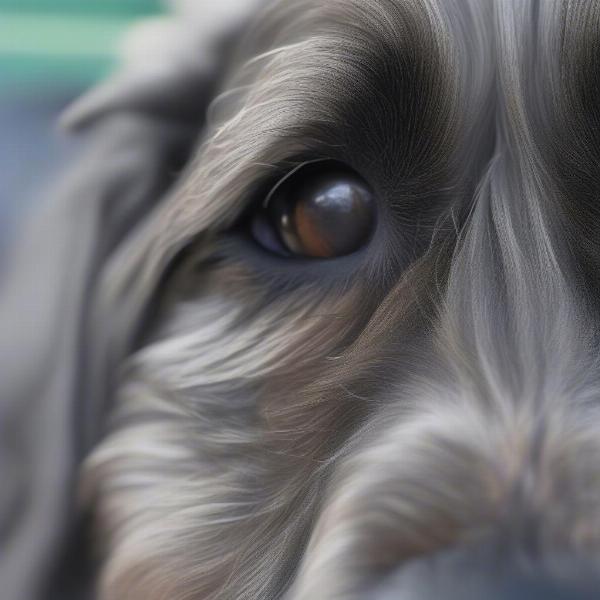Grey hair in dogs, a common sign of aging, is a fascinating topic for many dog owners. While often associated with getting older, grey hairs can appear for a variety of reasons, not always directly related to a dog’s age. This article will explore the science behind canine greying, the factors that contribute to it, and what it means for your furry friend’s health and well-being.
Why Do Dogs Get Grey Hair?
Just like in humans, grey hair in dogs is primarily caused by a decrease in melanin production. Melanin is the pigment responsible for giving hair its color. As dogs age, the pigment-producing cells, called melanocytes, become less active, resulting in less melanin and therefore lighter, greyer hair. This is a natural process and usually starts around the muzzle and face, gradually spreading to other areas.
 Grey Hair Around a Dog's Muzzle
Grey Hair Around a Dog's Muzzle
However, age isn’t the only factor. Stress, genetics, and even certain medical conditions can also contribute to premature greying. For example, some breeds are genetically predisposed to greying earlier than others. Similarly, chronic stress can accelerate the aging process, including the greying of hair.
Is Grey Hair in Dogs a Sign of Illness?
While most cases of grey hair are simply a cosmetic change related to aging or genetics, it’s important to be aware that certain health issues can also cause changes in coat color. Nutritional deficiencies, thyroid problems, and some autoimmune diseases can sometimes lead to changes in pigmentation. If you notice sudden or unusual changes in your dog’s coat color, including rapid greying, it’s essential to consult your veterinarian. They can rule out any underlying medical conditions and provide appropriate advice.
Caring for Your Grey-Haired Dog
Caring for a grey-haired dog is much the same as caring for any dog. Regular grooming is important to keep their coat healthy and shiny. Choose high-quality dog food appropriate for their age and activity level to ensure they receive all the necessary nutrients. Regular exercise and mental stimulation are crucial for their overall health and well-being, regardless of their coat color. best dogs for single men Remember that a healthy lifestyle can help slow down the aging process and keep your dog feeling young and vibrant, even with a sprinkling of silver.
Embracing the Silver Years
Grey hair in dogs is a natural and often beautiful part of their life journey. It’s a testament to their experiences and a reminder of the unconditional love they bring into our lives. Embrace those silver hairs – they are a badge of honor, earned through years of companionship and loyalty.
FAQ
-
At what age do dogs start getting grey hair? Most dogs start to show grey hairs around their muzzle between the ages of five and seven. However, this can vary based on breed and individual factors.
-
Can stress cause grey hair in dogs? Yes, chronic stress can accelerate the aging process in dogs, which can include premature greying.
-
Should I be worried if my dog is greying quickly? Sudden or unusual changes in coat color, including rapid greying, should be checked by a veterinarian to rule out any underlying health issues.
-
Does grey hair affect a dog’s health? In most cases, grey hair itself does not affect a dog’s health. It is a cosmetic change related to aging or genetics.
-
How can I care for my grey-haired dog’s coat? Regular grooming with appropriate brushes and shampoos can help maintain a healthy and shiny coat, even with grey hair.
-
Does diet affect a dog’s coat color? A balanced and nutritious diet is essential for overall health, including coat health. Nutritional deficiencies can sometimes affect pigmentation.
-
Are some breeds more prone to greying? Yes, certain breeds are genetically predisposed to greying earlier than others.
ILM Dog is a leading international dog website dedicated to providing expert advice on dog care and well-being. From breed selection and health care to training and nutrition, fleeces for dogs and snowsuits for dogs outerwear for dogs we offer a wealth of information for dog owners worldwide. Contact us at [email protected] or +44 20-3965-8624. ILM Dog is your trusted source for everything dog-related.